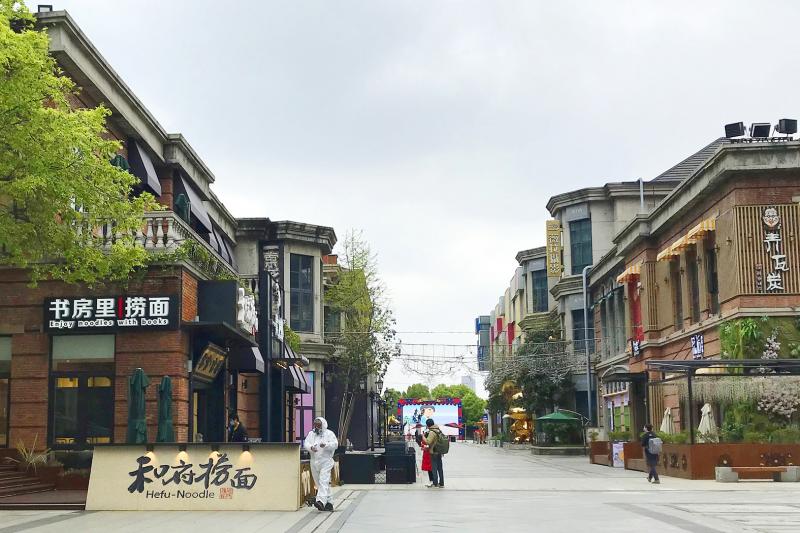China’s central bank yesterday cut an interest rate on loans to banks by the largest margin in five years and injected 50 billion yuan (US$7 billion) into the financial system to help the world’s second-largest economy weather the coronavirus impact.
The People’s Bank of China (PBOC) said on its Web site that it launched a 50 billion yuan reverse repurchase operation yesterday and lowered the seven-day reverse repurchase rate from 2.40 percent to 2.20 percent. It did not give a reason for the moves.
It was the “largest cut since 2015 and takes the seven-day reverse repo rate to its lowest on record,” said Julian Evans-Pritchard, senior China economist at Capital Economics Ltd in Singapore.

Photo: AP
“By offering funds at a lower rate, the PBOC will be able to keep market interbank rates low even as the liquidity from the RRR [reserve requirement ratio] cuts is absorbed by the banking system,” he said, referring to an earlier lowering of the amount of cash lenders must keep in reserve.
COVID-19’s global spread has dampened hope of a quick recovery in export-dependent China.
The latest move comes as governments and central banks around the world ease monetary policy and unveil titanic stimulus measures worth about US$5 trillion to counter the economic impact of the pandemic, which forecasters warn will cause a deep recession.
The Chinese Communist Party politburo on Friday called for stronger counter-cyclical policy measures and a step-up in stimulus.
The politburo said where appropriate, the fiscal deficit ratio should be raised, special Treasury bonds should be issued, and that there should be an increased quota of local government special bond issuance, Xinhua news agency reported.
Effective loan rates should also be guided down, “maintaining reasonable and sufficient liquidity,” officials added.
Yesterday’s move appears to have had little impact on market sentiment, with Shanghai’s key stock index about 1 percent lower in the afternoon.
As COVID-19 ravages the global economy, analysts have cut growth forecasts for China, which was the first to see the effects from containment measures.
S&P Global Ratings said its revised economic growth estimate for China for this year is now almost half its pre-outbreak growth assumption of 5.7 percent.
Australia and New Zealand Banking Group economists Xing Zhaopeng (邢兆鵬) and Raymond Yeung (楊宇霆) said in a note that the rate cut “is intended to lower Chinese corporates’ funding costs.”
They expect it would be followed by cuts in the medium-term lending facility rates and loan prime rate.
Ma Jun (馬駿), a central bank adviser, told state media that China still has ample room for monetary policy adjustment and the rate decision took into consideration the return of Chinese companies to work, the global virus situation and a deterioration in the external economic environment.
Additional reporting by Reuters

Stephen Garrett, a 27-year-old graduate student, always thought he would study in China, but first the country’s restrictive COVID-19 policies made it nearly impossible and now he has other concerns. The cost is one deterrent, but Garrett is more worried about restrictions on academic freedom and the personal risk of being stranded in China. He is not alone. Only about 700 American students are studying at Chinese universities, down from a peak of nearly 25,000 a decade ago, while there are nearly 300,000 Chinese students at US schools. Some young Americans are discouraged from investing their time in China by what they see

MAJOR DROP: CEO Tim Cook, who is visiting Hanoi, pledged the firm was committed to Vietnam after its smartphone shipments declined 9.6% annually in the first quarter Apple Inc yesterday said it would increase spending on suppliers in Vietnam, a key production hub, as CEO Tim Cook arrived in the country for a two-day visit. The iPhone maker announced the news in a statement on its Web site, but gave no details of how much it would spend or where the money would go. Cook is expected to meet programmers, content creators and students during his visit, online newspaper VnExpress reported. The visit comes as US President Joe Biden’s administration seeks to ramp up Vietnam’s role in the global tech supply chain to reduce the US’ dependence on China. Images on

New apartments in Taiwan’s major cities are getting smaller, while old apartments are increasingly occupied by older people, many of whom live alone, government data showed. The phenomenon has to do with sharpening unaffordable property prices and an aging population, property brokers said. Apartments with one bedroom that are two years old or older have gained a noticeable presence in the nation’s six special municipalities as well as Hsinchu county and city in the past five years, Evertrust Rehouse Co (永慶房產集團) found, citing data from the government’s real-price transaction platform. In Taipei, apartments with one bedroom accounted for 19 percent of deals last

US CONSCULTANT: The US Department of Commerce’s Ursula Burns is a rarely seen US government consultant to be put forward to sit on the board, nominated as an independent director Taiwan Semiconductor Manufacturing Co (TSMC, 台積電), the world’s largest contract chipmaker, yesterday nominated 10 candidates for its new board of directors, including Ursula Burns from the US Department of Commerce. It is rare that TSMC has nominated a US government consultant to sit on its board. Burns was nominated as one of seven independent directors. She is vice chair of the department’s Advisory Council on Supply Chain Competitiveness. Burns is to stand for election at TSMC’s annual shareholders’ meeting on June 4 along with the rest of the candidates. TSMC chairman Mark Liu (劉德音) was not on the list after in December last